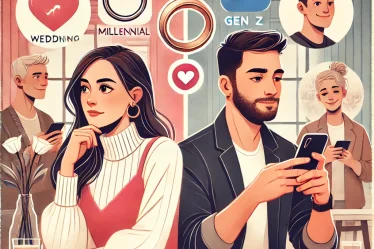
In 2025, more couples are asking a big question: Is marriage still necessary? While love is far from dead, the traditional concept of marriage is being reexamined, redefined, and in some cases, replaced. Whether you’re already married, engaged, or long-term partners without a marriage license, this article breaks down what’s happening, why it matters, and what it means for you.
Is Marriage on the Decline?
The short answer: yes—but not for everyone, and not for the same reasons.
In the U.S., the marriage rate has steadily dropped over the past few decades. According to recent data from the Census Bureau and Pew Research, only about 50% of adults are currently married, down from 70% in 1970. The divorce rate, once sky-high, is also dropping—but that’s largely because fewer people are tying the knot in the first place.
What this means for couples:
Marriage isn’t disappearing overnight, but it’s no longer the automatic next step. It’s now one option among many. That gives couples more freedom, but also more decisions to make.
Why Are Fewer People Getting Married?
Couples today are rethinking marriage for a mix of practical and emotional reasons:
- Financial stress: The cost of weddings, housing, and student debt makes marriage feel more like a luxury than a necessity.
- Personal development: Many people prioritize careers, mental health, or travel before committing legally.
- Fear of divorce: Watching parents or peers go through painful splits makes some couples hesitant.
- Living together feels enough: Cohabiting offers emotional intimacy and daily companionship—without paperwork.
For couples in long-term relationships, this can be empowering. It opens the door to conversations like: Do we need marriage to feel committed? or What do we want our future to look like—legally, financially, emotionally?
Changing Views on Love & Loyalty
In 2025, love isn’t seen as something that has to fit into one mold. Loyalty isn’t always defined by legal contracts—it’s about communication, choice, and consistency.
Younger generations (especially Gen Z) are more likely to value emotional availability over traditional structure. Some are embracing:
- Open relationships
- Polyamory
- Conscious monogamy
- “Chosen family” models
What this means for couples:
You don’t have to follow one script. Loyalty today is about mutual understanding, not just rings and vows. Couples who talk openly about boundaries, values, and goals tend to build stronger foundations—no matter their legal status.
The Rise of Alternatives to Marriage
Couples now have more options than ever before. Some are skipping the wedding entirely and choosing alternatives like:
- Domestic partnerships: Legal recognition without full marriage
- Cohabitation agreements: Legal contracts for shared property and responsibilities
- Civil unions: Still available in some places
- Solo polyamory: Where individuals maintain autonomy while forming multiple deep connections
Each of these comes with its own pros and cons. Some offer legal protections, while others don’t. For couples, it’s worth researching what setup best fits your lifestyle, values, and future plans.
Is Marriage Still Valuable?
Despite all the changes, marriage still has advantages:
- Legal benefits: Tax breaks, inheritance rights, health insurance
- Social acceptance: In many cultures, marriage is still seen as a milestone
- Stability: Some couples find comfort in the clarity and structure marriage brings
But marriage is no longer the default proof of commitment. For couples who do choose it, the key is doing it with intention—not pressure.
The Future of Commitment
As we move further into the digital age, commitment looks different. Remote work, dating apps, and evolving gender roles are reshaping how couples connect and grow together.
Experts predict:
- Greater emotional focus: Emotional intelligence will be more important than social roles.
- Flexible relationship contracts: Couples may define their own terms instead of relying on tradition.
- Tech-assisted connection: AI and virtual therapy are already helping couples communicate better.
What this means for couples:
Talk often. Check in about what commitment means to both of you. Create your own version of “forever”—whether that includes a ring or not.
Final Thoughts: Redefining Love and Loyalty Together
Marriage might be changing, but love and loyalty are alive and well. What matters most is that you and your partner are aligned—on values, on expectations, and on how you define your relationship.
Whether you’re legally married, planning a future together, or simply showing up for each other every day, your commitment is real.
And in 2025, that’s more than enough.



